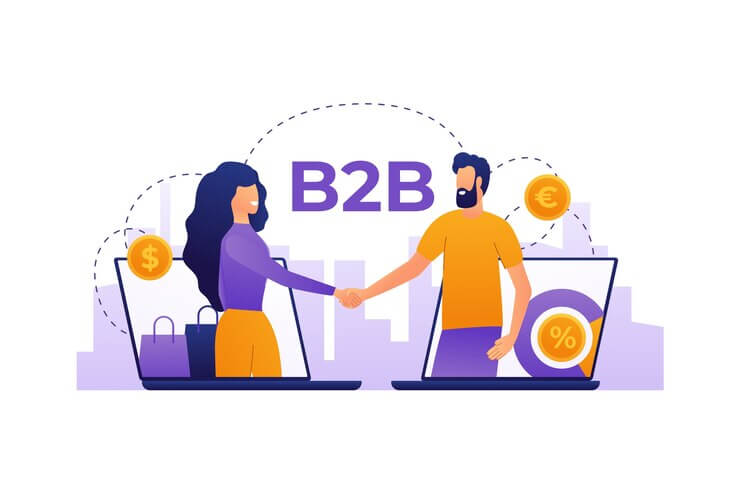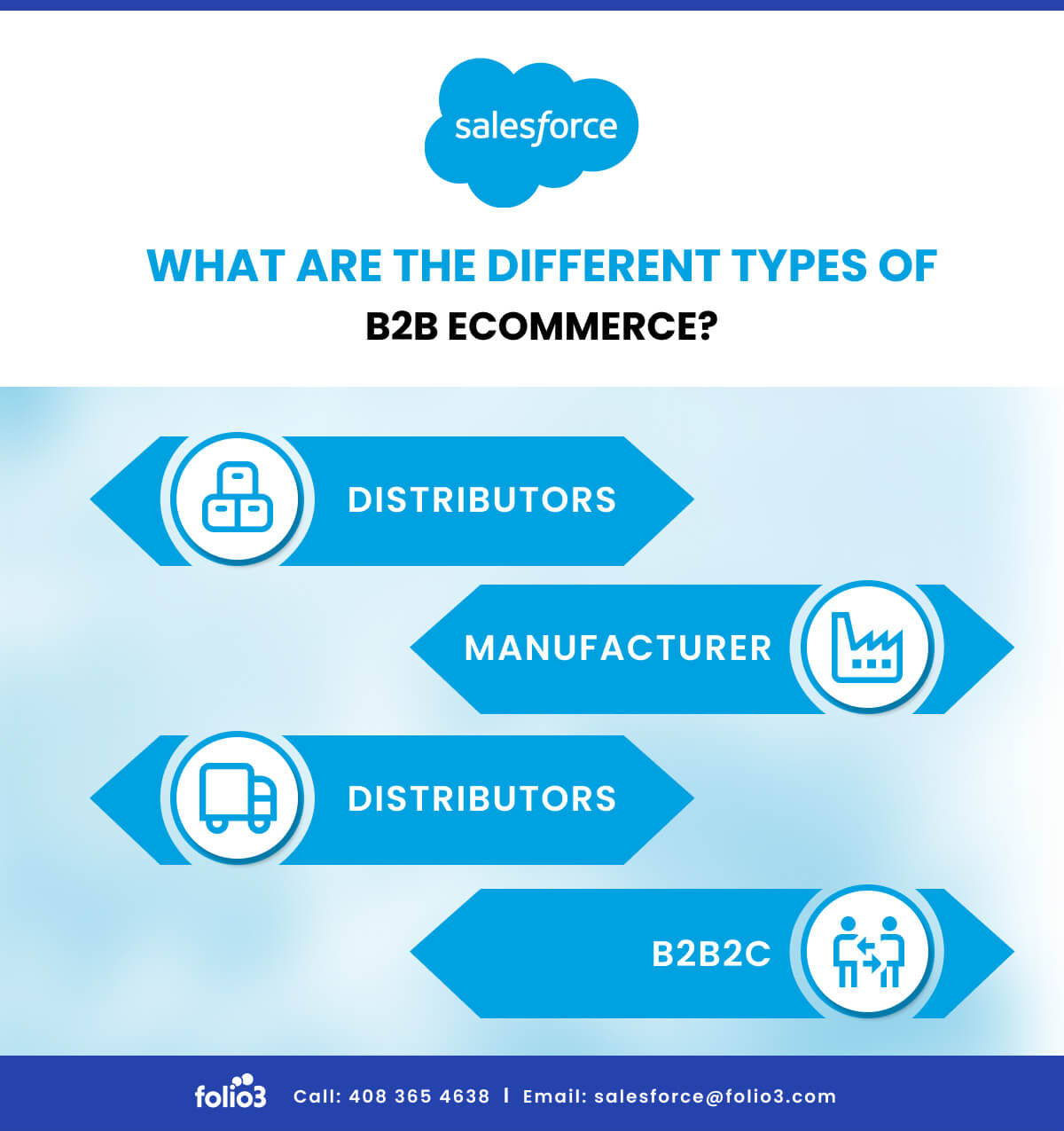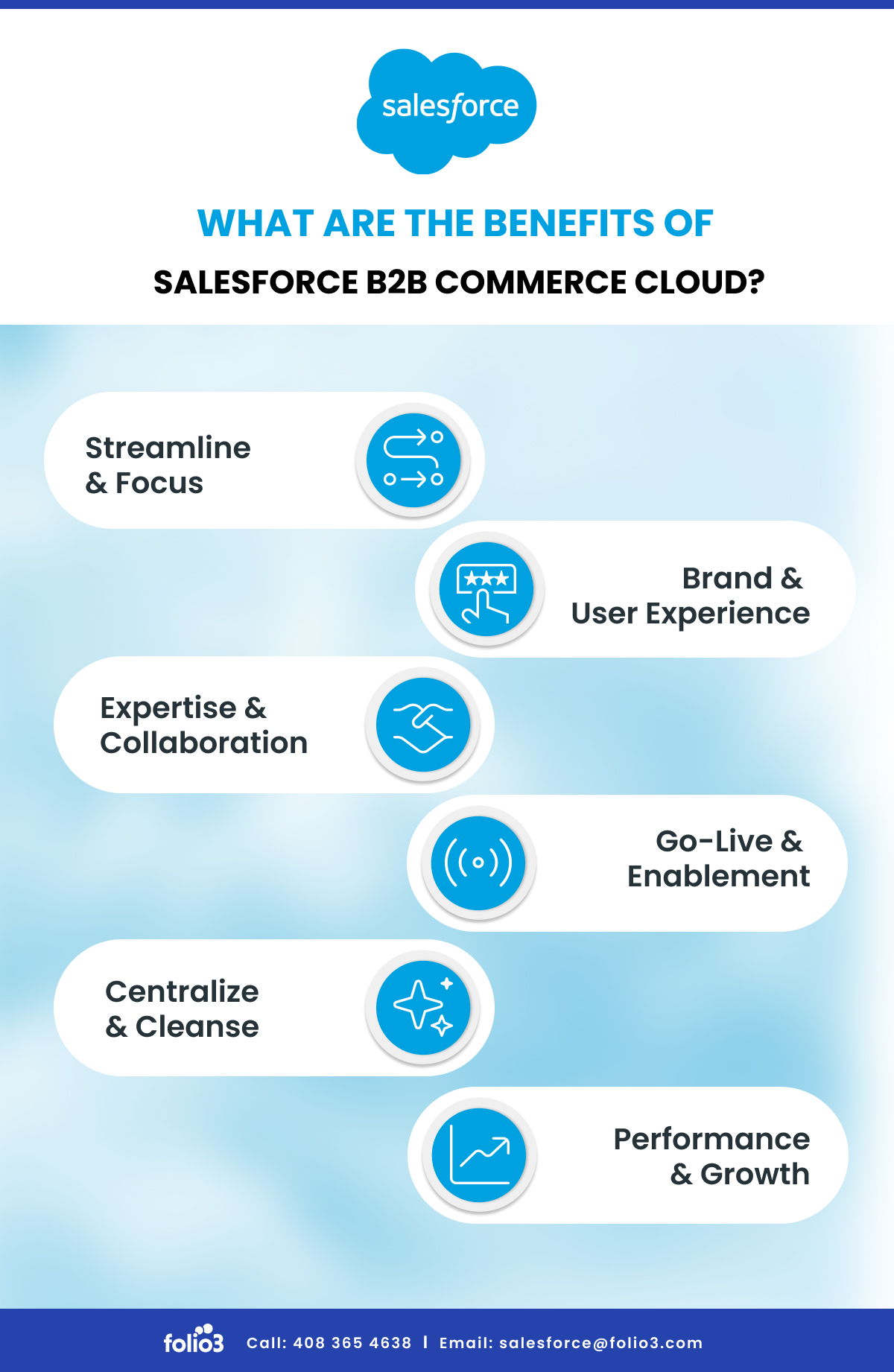B2B eCommerce is a rapidly growing industry, with more and more businesses recognizing the benefits of online sales channels. However, navigating the complexities of B2B eCommerce can be challenging, especially for those new to the space.
This blog covers everything you need to know to succeed in B2B eCommerce, from understanding the unique needs of B2B customers to implementing effective marketing strategies. Whether you’re a seasoned B2B eCommerce pro or just getting started, our guideline is a must-read for anyone looking to thrive in this competitive industry.
What Is B2B eCommerce?

Business-to-business (B2B) commerce is the online selling of goods and services between businesses. It differs from B2C, where the company sells to the customers. B2B transactions take place through marketplaces or sales portals designed especially for them. B2B platforms let wholesalers, manufacturers, distributors, and other businesses buy, sell, and trade various products from each other.
The critical components of B2B eCommerce include:
- A colossal market worth trillions of dollars. Countless businesses deal with each other daily.
- B2B eCommerce is considered one of the fastest-growing commerce sales models. With an eCommerce boom underway, this growth is expected to continue.
- Using a B2B eCommerce platform helps streamline businesses’ buying processes and saves them time, money, and effort.
What Are the Different Types of B2B eCommerce?
There are different B2B models to choose from, each catering to specific needs. The most common B2B eCommerce models include:
Wholesale
Businesses (distributors or wholesalers) purchase inventory in bulk at a discount and resell it to other companies (mostly retailers) for a profit. A quality B2B eCommerce platform improves this by automating inventory management and order fulfillment.
Manufacturer
A manufacturer can use a B2B eCommerce platform to sell their products directly to businesses, bypassing distributors. Companies that build tailored goods or have few but large clients can benefit from directly dealing with the manufacturer.
Distributors
These are intermediaries between the manufacturer and the retailer. Distributors can leverage B2B eCommerce platforms to build and maintain relationships with each party, offering a better selection of products and significantly more efficient order fulfillment.
B2B2C
In B2B2C, a three-way business relationship involves a B2B company using its platform to connect a business with the consumer. This cuts out the middleman, giving store owners more control over branding efforts and customer experience.
How Does Salesforce B2B Commerce Cloud Help B2B Business?
The Salesforce B2B commerce cloud is a cloud-based platform designed to cater to B2B business needs in the eCommerce space. Here’s how the Salesforce B2B commerce cloud works:
- It streamlines the buying process with self-service portals, customized catalogs, automated workflows, and other functionalities that simplify the buying process for businesses. With Salesforce commerce cloud optimization, B2B business can supercharge their businesses unlike anything before.
- It helps with complex order management when it comes to unique requirements. The B2B commerce cloud has tools to handle volume discounts, custom order configurations, and contract pricing.
- The B2B commerce cloud improves customer relationships by offering personalized product recommendations, CRM system integration, account management tools, and more to improve the customer experience.
- With features like quote generation, real-time inventory visibility, and order tracking, sales teams can close deals faster and offer customers significantly better service.
- The Salesforce B2B commerce cloud is built on a scalable architecture to accommodate inevitable business growth. Platforms can be tailored for specific workflows and other branding requirements.
- The Salesforce B2B commerce cloud is critical to the Salesforce 360 product catalog. It seamlessly integrates with the Salesforce Service Cloud and Salesforce Marketing Cloud.
These are just a few ways businesses can benefit from using the B2B Commerce Cloud. As you read ahead, you will learn why companies should use it, how to implement it, its benefits, and how to choose one for your B2B business.
Why Should B2B Businesses Implement Salesforce B2B Commerce Cloud?
The main reasons why B2B businesses need the Salesforce B2B commerce cloud include:
Better Customer Experience
The B2B commerce cloud streamlines B2B buying processes with self-service portals, personalized product catalogs, and quick reordering. This lets customers quickly find their needs, improving customer satisfaction and brand loyalty. With contract pricing, automated workflows, and customer catalogs, B2B customers can save time and resources when purchasing.
Improved Sales and Growth
A satisfied customer is a returning customer. The B2B commerce cloud lets your sales teams leverage real-time inventory visibility and use quote generation to close deals faster. Task automation prevents salespeople from spending too much time doing mundane tasks. It lets them focus on high-priority tasks such as building customer relationships and focus on strategic account development.
Seamless Integration and Scalability
By integrating with Salesforce Sales Cloud and Salesforce Marketing Cloud, the B2B commerce cloud provides a 360-degree view of the customer. This allows the business to improve collaboration and personalization across several departments.
Being a cloud-based platform, the Salesforce B2B commerce cloud scales with your business. This allows you to accommodate traffic growth, rise in orders, and even product complexity without needing significant infrastructural changes. Consider working with Salesforce commerce cloud developers to get the best possible results.
What Are the Benefits of Salesforce B2B Commerce Cloud?
Implementing the Salesforce B2B commerce cloud is a complex process, but here is a simplified way of showing the benefits of picking Salesforce commerce cloud development:
- Evaluate business needs by clearly defining business goals and required functionality. Audit your current sales mechanisms, customer bases, and relevant product data to determine what’s working and needs improvement.
- Build a team of experts in project management, sales, IT, customer service, and marketing to discover the different ways the B2B commerce cloud can be used.
- Contact Salesforce commerce cloud consultants with experience in B2B commerce cloud implementations. Use their guidance and expertise to ensure the process is effortless and effective.
To Implement the Salesforce B2B Commerce Cloud, here’s what you need to do:
- Configure the B2B commerce cloud instance, including setting up user accounts, integrations, security protocols, and other systems. If you get stuck, have Salesforce commerce cloud support can guide you.
- Migrate all product, customer, and order histories into your platform. You may need data cleansing and transformation to ensure the data is compatible with the B2B commerce cloud. Improve this with Salesforce commerce cloud migration.
- Designing and developing the B2B storefront involves customizing the store layout, branding, smooth navigation, and user experience that aligns with the brand’s identity and customer requirements.
- Configure pricing rules and product catalogs, build workflows and make tax calculations for your business needs.
- Before launch, ensure all features and functionality have been thoroughly tested. Train your sales team on the store’s ins and outs and ensure all users can utilize the B2B commerce cloud effectively.
Once all is said and done, here is what to do post-launch:
- Monitor website metrics continuously, including traffic, conversion rate, customer satisfaction, and more. Use this data to improve and optimize your Salesforce B2B Commerce Cloud implementation.
- Make the most of Salesforce’s customer experience and support options. Working with a Salesforce commerce cloud implementation partner also helps with ongoing maintenance and other support services.
Conclusion
B2B eCommerce is a rapidly growing industry with immense potential for businesses of all sizes. By following the guidelines outlined in this article, you can create a successful B2B eCommerce strategy that drives sales, improves customer satisfaction, and enhances your brand’s reputation. With an effective Salesforce commerce cloud implementation strategy, you can focus on creating a user-friendly and personalized customer experience, optimizing your website for mobile devices, and utilizing data analytics to gain insights into customer behavior. Ensure that your payment and shipping processes are seamless, and consider offering custom pricing and bulk discounts to attract and retain B2B customers.
FAQs
Does Amazon Use Salesforce Commerce Cloud?
No, Amazon uses its eCommerce platform. It recently introduced the ‘Buy with Prime’ feature for commerce cloud merchants.
Is Salesforce Commerce Cloud a CRM?
No, it is a B2B commerce tool. The Salesforce Sales Cloud is the brand CRM.
How Many Companies Use Salesforce Commerce Cloud?
It’s hard to specify exactly how many companies do, but a rough estimate would include thousands of mid-size and large-scale B2B businesses.

Navaid Ahmed
Director Of Engineering at Folio3 Software | Head of Product Management
Navaid Ahmed is a Seasoned Salesforce CRM expert, who brings a wealth of experience in optimizing sales processes, enhancing customer relationships, and driving business growth. With a deep understanding of Salesforce's capabilities, Navaid specialize in crafting tailored solutions that empower organizations to streamline operations, boost productivity, and achieve their sales objectives.

